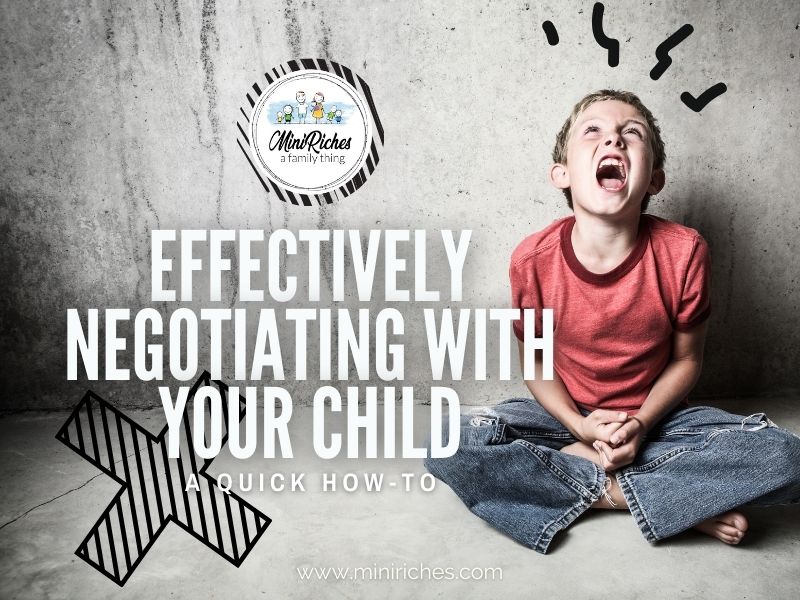
Effectively Negotiating With Your Child: A Quick How-To
One of the popular parenting tips out there is to give your child choices, so they feel like they have control over their decisions.
I can’t say I 100% agree or disagree with the above when negotiating with your child.
It has helped us get out of many arguments and skip the long, drawn-out fits of frustration, but at what point does giving your child choices have a negative effect?
When our oldest was around three years old, I began giving him options. “You can do that and have this, or you can do this and have that. Which do you want?” I thought this was the right solution. We get to skip the meltdown because he felt in charge of his decisions, and he wasn’t being controlled.
This continued over the years, and everything was going well.

Enter negotiating with your child.
Our oldest soon learned that he could present his own solution of “either-or.” Being that I was a first-time mother, this completely caught me off guard.
I started indulging in his requests instead of sticking to my options.
He wasn’t being unreasonable. So why not?
I was wrong—so very wrong.
The consequences of always negotiating with your child.
In an attempt to avoid meltdowns, I trained our son in the art of negotiation. Not only did we now have a strong-willed child, but now we had a strong-willed child who liked to negotiate.
This eventually led to arguments when I could no longer give him an option or listen when he had a reasonable alternative. It may have been reasonable-sounding to him, but it simply was not what needed to get done.
What happens when mom stands her ground? Crying, whining, and tantrums ensue. What do you say when negotiating with your child, and you’re met with the line, “I’m definitely not doing it now that I’m grounded!”
Yes. Yes, you will do it.
The crying and meltdowns like this should pretty much be done by age 5, so to have an over nine-year-old still breaking into tears when he didn’t get his way was the first sign that we had a problem.
When you resort to negotiating with your child, the discussion and then the argument can last for hours. That was sign number two that we had a problem.
Not only would I fall behind on my stay-at-home-mom duties, but I wasn’t able to pay attention to our other children because I was consumed in negotiations with one.

At first, I handled this by yelling and making threats of grounding.
I see the error in that now.
I would often be so embarrassed at my poor parenting skills that I would try to forget the confrontation, and then I’d also ignore the punishment and even the infraction that started the whole thing.
Negotiating with your child is mentally exhausting.
I can tell you that after a handful of years later, we are doing much better. There are fewer meltdowns and much less yelling at each other, all because I changed my parenting strategy. I’m not perfect by any means, but it has helped end arguments sooner, cause less negotiating, and neither one of us has to be embarrassed about poorly handling the situation.
I attribute my light-bulb moments to Dr. Ray Guarendi. A clinical psychologist, he has over 40 years of experience working with children and families. He has witnessed the common time-tested factors that consistently contribute to success in marriages and families. His down-to-earth, realistic parenting strategies caught my ear and have helped immensely!
Here are my favorite parenting tips from Dr. Ray, along with a few of my own I’ve learned through the years for effectively negotiating with your child.

Tip #1: Be clear with what you’re asking.
Telling your child to clean his room may sound pretty straight forward, but not to the child. This simple statement opens up a whole can of possibilities that may not even include picking up.
Try saying, “Put your toys away where they belong and don’t just stuff them under your bed.” or, “Bring your dirty clothes to the hamper, and then make your bed.” These are direct instructions for your child to follow, and giving direct instructions to your child leads to less negotiating with your child.
Also, set a time limit for completing the task and consider starting a timer—be sure to allow an appropriate amount of time for their age. Completing tasks within an allotted amount of time creates predictability and structure.
Don’t jump into negotiating with your child If being clear with what you’re asking doesn’t work. Instead, try tip number two—a strategy Dr. Ray suggests.
Tips #2: Use IF-THEN statements.
IF you do not do as you have been asked, THEN you will not be allowed time on video games for the rest of the week.
Choose whatever consequence you feel is fitting, but be clear and unwavering. You will easily find yourself negotiating with your child when using IF-THEN statements if you go into the conversation unprepared.

Your little master negotiator may come back with something along the lines of, “But mom, that is going to take FOREVER! I’ll pick up my clothes, but then I want to finish my show before I do the rest of it, or I’ll never get to finish it!”
Enter tip number three!
Tip #3: Assert your authority.
Asserting your authority is another excellent tip from Dr. Ray. Asserting your authority does not mean that you get physically or verbally overbearing. I suggest asserting your authority by repeating the same IF-THEN statement.
You said what you meant, do not change it to start negotiating with your child or because they are complaining. Sticking to what you said, let’s your little mini-me know that their proposal has been denied, and they now need to do as they have been asked.
Depending on the child, about now is when you can cue the tantrum and the whining.
I suggest another IF-THEN statement to address the situation. Something like, “IF you continue this poor behavior of whining and complaining, THEN you will also get TV time taken away for the rest of the day.”
I would like to stress the importance of remaining calm while asserting your authority. Losing your cool will not help at all. The next tip is helpful if you feel yourself getting worked up.

Tip #4: Don’t respond and don’t start negotiating with your child.
I don’t respond after I’ve made myself clear and final. Our son would often continue with, “BUT MOM!” I would look at him and say, “You heard me.”
Now all I have to do is give him a you-heard-me look, and he starts doing as he was asked.
It took us a while to get to this point, and there were times where I was met with outright refusal.
Tip #5: What to do if your child flat out refuses.
Dr. Ray has a simple yet effective solution to this one! Stay calm, and give your child nothing. No TV, no toys, no tablet, no outside time, no video games, and no phone until your child does as they were told. This type of response may seem harsh, but Dr. Ray put it best when he said:
Discipline without love may be harsh. Love without discipline is child abuse.
— Dr. Ray Guarendi
It’s our role as parents to raise our children and give them the tools to help them succeed as adults and as parents of their own. We can love our children so much that it hurts, but letting them get away with refusal without discipline is only hurting them.
As parents, we know our children best, and we can tell when something is off. It’s still ok to not negotiate with your child even if you suspect their refusal is tied emotionally to something unrelated to the task at hand. Rather than negotiating with your child, empathize with your child. Stay calm, come down to your child’s level, and in a caring tone of voice, simply ask, “What’s going on that has you fighting this so much?”
You may find they’ve had a rough day at school, maybe they’re in the middle of a disagreement with a friend, or perhaps they just woke up on the wrong side of the bed—we’ve all been there. Offer your child comfort by letting them know things in this life won’t always go the way they want them to, but we can’t let that stop us from doing what we need to do. Follow up with another IF-THEN statement, and then offer to help your child with the task to show them you’re there for them.
I’ve heard Dr. Ray mention that you are the kindest teacher your child will ever have. If you don’t discipline now, the world will discipline your child later—and there’s a good chance the world won’t be lovingly negotiating with your child. On that same note, don’t drop the hammer on your child when you feel they’re struggling emotionally—instead, be there by their side.
Tip #6: Nothing is wrong with having a strong-willed child.
Having a strong-will is a fantastic quality—one that can help children overcome some very challenging obstacles in their life to come. However, you are not an obstacle in their life! You are their loving parent who is trying your best to prepare your child for the world ahead of them.
One of my husband’s favorite life quotes comes from the movie Rocky Balboa. I can’t believe I’m about to do this, but I feel like the quote helps explain the importance of not viewing your child’s strong-will as a bad quality. It’s a long one, so bear with me:
Let me tell you something you already know. The world ain’t all sunshine and rainbows. It’s a very mean and nasty place, and I don’t care how tough you are, it will beat you to your knees and keep you there permanently if you let it. You, me, or nobody is gonna hit as hard as life. But it ain’t about how hard you hit. It’s about how hard you can get hit and keep moving forward; how much you can take and keep moving forward. That’s how winning is done! Now, if you know what you’re worth, then go out and get what you’re worth. But you gotta be willing to take the hits, and not pointing fingers saying you ain’t where you wanna be because of him, or her, or anybody. Cowards do that and that ain’t you. You’re better than that! I’m always gonna love you, no matter what. No matter what happens. You’re my son and you’re my blood. You’re the best thing in my life. But until you start believing in yourself, you ain’t gonna have a life.
— Sylvester Stallone, Rocky Balboa
Sometimes your child won’t always see you are their loving parent, and that is ok. It is also ok to validate your child’s feelings without giving in to their demands and without negotiating with your child. It can be beneficial to remind them—lovingly, of course—of the 6th commandment to honor thy father and mother.
In conclusion:
If you continue to explain and reason, you will find yourself in a rabbit hole of the time-consuming act of negotiating with your child conversation that is unnecessary and won’t make a difference in the end.
Keep the conversation short.
Your pre-teen will not suddenly agree with you if you spend the next 2 hours explaining yourself. They don’t have the mental capacity to fully understand where you are coming from as an adult. You’ll waste your time, your family’s time, and your child will expect the long-drawn-out negotiations every time they disagree, which will get you nowhere.

Boy can I relate to this post! 😂 I’ve noticed my oldest becoming a little negotiator herself and I’m working to nip that before it gets out of hand.
I’ve bookmarked your post so I can come back and remind myself of the tips. Great tips!
Thanks! Yes, I hope these tips help. I definitely still slip up at times, but when I follow my guidelines, things go more smoothly.
Great resource!! Thank you for sharing.
Thanks, You’re welcome!
This is a better system than what I got growing up. My parents used the “Darth Vader School of Negotiation”. They’d always change things up and when I objected they would reply “I am altering the deal, pray I don’t alter it any further.” lol!
Darth Vader School of Negotiation, LOL! Well, this has worked for us and everyone has to find what works for their family, whether it’s Star Wars or Dr. Ray.
Great post, I feel some things are negotiable but in the end the kids no the buck stops with me!
Agreed, some things are negotiable, but not ALL things lol